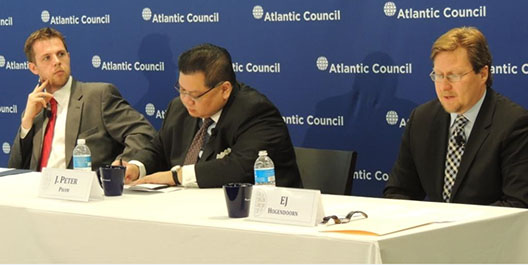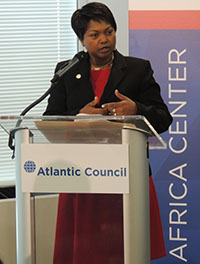
Despite the “never again” rhetoric that followed the 1994 Rwandan genocide, terrible violence in some African states—such as the Central African Republic, Somalia, and South Sudan—persists, and the international response to these crises has generally been slow and inadequate. The twentieth anniversary of the genocide is cause for reflection, and the Africa Center hosted an event on Tuesday that addressed the question of what, if anything, the international community has learned about preventing genocide since 1994. The event featured H.E. Mathilde Mukantabana, Rwandan ambassador to the United States, Jonas Claes, senior program officer at the US Institute for Peace, and E.J. Hogendoorn, deputy director for Africa at the International Crisis Group, in a panel discussion moderated by Africa Center Director J. Peter Pham.
 Ambassador Mukantabana offered introductory remarks, noting that Rwanda “lost everything” in the genocide. Institutions that formed the bedrock of Rwandan society, including the government, church, and family, were all complicit in the murder of Rwandan citizens. But the envoy also sounded a note of hope, stressing the Rwandan people’s “tireless determination” to recover from the genocide, which has led to significant economic and socio-political progress in the country since 1994. Rwandans will not allow the genocide to be the “final word” on their country.
Ambassador Mukantabana offered introductory remarks, noting that Rwanda “lost everything” in the genocide. Institutions that formed the bedrock of Rwandan society, including the government, church, and family, were all complicit in the murder of Rwandan citizens. But the envoy also sounded a note of hope, stressing the Rwandan people’s “tireless determination” to recover from the genocide, which has led to significant economic and socio-political progress in the country since 1994. Rwandans will not allow the genocide to be the “final word” on their country.
While Rwanda has inarguably made progress, E.J. Hogendoorn argued that the international community’s efforts to prevent mass atrocities in Africa have been uneven, at best. The Responsibility to Protect (R2P) doctrine has gained broad, if grudging, acceptance in principle, but is far from becoming customary in international law. Peacekeeping remains a difficult, dangerous, and expensive business that few countries have the capacity or will to execute. But he too ended on a note of tentative optimism, noting that further progress is not impossible. As early warning systems are refined, and as multilateral institutions are rebalanced to include a more representative, less “Westernized” set of perspectives, humanitarian interventions may become more effective.
Jonas Claes emphasized in his remarks that while R2P is often conflated with the demand for a military response, in reality, the military option is a last resort. There are a number of non-military components involved in R2P, one of the most effective of which is local media training to prevent the dissemination of hate speech and incitement by local journalists. He further highlighted that R2P is inherently burdened by the fact that, whenever a proactive, pre-conflict intervention is successful, it becomes impossible to prove that a tragedy has been prevented.
J. Peter Pham noted that the question of agency is often forgotten and that an important lesson from the Rwandan genocide was that the killing was stopped not by the international community, whose actions during the crisis were often ambiguous, but by a force of Rwandans with the will and capacity to act. He also observed that while African crisis response capabilities have improved greatly in the past two decades, African countries have yet to coordinate their military forces and allocate their resources appropriately for joint action in the manner that other collective security arrangements have, thus forcing them to “reinvent the wheel” each time an intervention is authorized.
The program ended with panelists fielding questions from an audience of US and foreign diplomats, military officers, academics, and private-sector representatives. The questions revolved around the challenges inherent in responding to the world’s most severe man-made crises.
Press Coverage
- Could the Rwandan Genocide Happen Again?–Paul D. Shinkman, U.S. News & World Report
